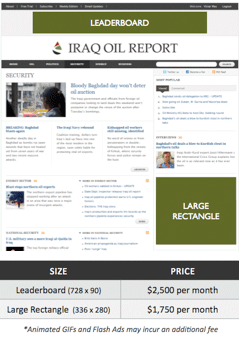
Last spring, Ben Lando faced a decision like many other journalists who suddenly find themselves unemployed. Should he try to stay in journalism, or face the thought of building a new career? For the recently laid-off UPI energy editor, the answer was simple: He was staying. But how?
Lando turned to a two-year-old side project he had launched as more of a hobby than a money-making business. In 2007, Lando had started blogging about the intersection of oil, money and the Iraq war on a WordPress site called Iraq Oil Report. He had thought of it while en route to a conference in Dubai: There was an audience of corporations, academics, and world governments interested in the topic, but nowhere to find a comprehensive take.
I remember first meeting Lando in 2007, when his beat at UPI was global energy. I signed up for his daily email list — at the time, a Google Groups email with headlines and links to his blog.
By summer 2009, Lando had gotten himself a visa and was couch surfing in Baghdad, filing freelance stories for various mainstream publications. “I was going to stay in journalism,” Lando told me. “I was going to make that happen somehow. Although I was open to almost anything, I really enjoyed the Iraq story.”
Lando, who just turned 30, had traveled to Iraq and around the Middle East previously for UPI. He had sources and connections to other journalists. While he freelanced, he was busy recruiting writers and business partners to turn his free-content blog and email into a business.
By December, Lando’s team had a paywall site set up, a slick email being sent out each day, a weekly wrapup edition underway, and plans in the works for an elite custom research service. Fast-forward to February 2010: Iraq Oil Report broke even for the first time. He’s still busy expanding the business, but Lando was heartened by his first neutral month.
 Here’s how the site makes its money. About 75 to 100 subscribers pay either $950 for six months or $1,350 per year for access to the site. (Some companies have multiple-use accounts.) That accounts for 60 percent of revenue. Advertisements — which appear on the site and in the daily and weekly emails, at prices ranging from $700 to $2,500 per month — account for another 10 percent of revenue. The research service accounts for the remaining 30 percent.
Here’s how the site makes its money. About 75 to 100 subscribers pay either $950 for six months or $1,350 per year for access to the site. (Some companies have multiple-use accounts.) That accounts for 60 percent of revenue. Advertisements — which appear on the site and in the daily and weekly emails, at prices ranging from $700 to $2,500 per month — account for another 10 percent of revenue. The research service accounts for the remaining 30 percent.
Peter Suomi, Iraq Oil Report’s vice president of business development, said they plan to expand each area, but for now subscriptions are their main focus. Developing a strong core product is critical to the success of other projects, he said. Plus, subscriptions provide a stable, easily renewable revenue stream.
Suomi said the site’s topic brings both advantages and disadvantages: “It is a very small niche of companies and people who want what we are putting out there,” he said. “But that being said, we don’t have many competitors.”
Bringing on subscribers is a matter of targeting that narrow group of potential customers directly, as well as doing broader marketing. Suomi said they’ve bartered with conferences that might host potential subscribers, giving the conferences free advertising in Iraq Oil Report emails in exchange for space at the event to promote the publication.
While Suomi said their overhead is relatively low, there are still costs. Lando runs a Baghdad bureau with two other fulltime reporters, who also serve as translators, in space he rents from The Guardian. (I asked Lando about how he handles security, but agreed not to go into the details here.) He has about another dozen stringers in provinces around the country he can draw on as needed. In the U.S., Iraq Oil Report employs a technical staffer, a business-development person and an editor.
Lando and his reporters also freelance for publications including The Wall Street Journal and Time. His Baghdad team works regularly for Platts, an energy information service. Lando keeps income from those jobs separate from his regular business.
“I’m doing a little…no, a lot of everything. That’s the biggest challenge,” Lando said of his new situation. “I’m a writer-editor. I’m a manager. I’m a business person.”